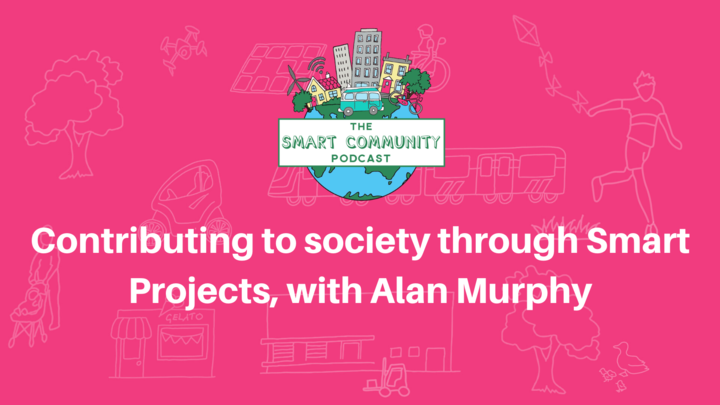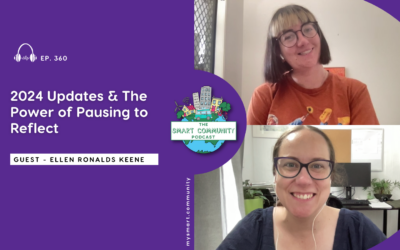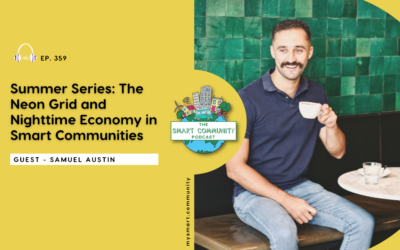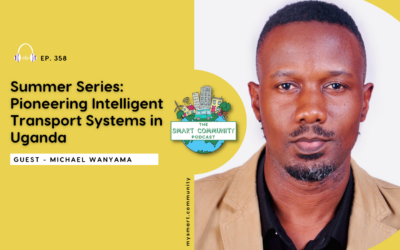In this episode of the Smart Community podcast, I had a great conversation with Alan Murphy, the Smart Dublin Regional Lead. Smart Dublin is an initiative of the four Dublin Local Authorities to engage with smart technology providers, researchers and citizens to solve challenges and improve city life. In this episode Alan tells us about his background in IT consulting and his passion for new ways of doing things using technology. He tells us about what sparked his interest in this Smart space, including friend of the podcast, Jonathan Reichental who you may remember from episode 77. Alan and I then discuss what Smart Dublin actually is and some of the projects Alan’s been working on with Smart Dublin in the areas of mobility, environment, energy and citizen engagement. Alan shares with us how he sees Ireland embracing Smart concepts, and the maturing of the conversation around Smart Communities. We talk about integration, and Alan explains Smart Dublin’s collaborative approach, plus we cover the power of having champions and stakeholders involved from the start. We finish our chat discussing the emerging trends in the mobility space of commute time now being considered by employers, and of incentivising more sustainable modes of transport. As always, we hope you enjoy listening to this episode as much as we enjoyed making it!
Listen here:
What we cover in this episode:
- Alan’s background in IT consulting and his passion for new ways of doing things using technology
- How listening to Jonathan Reichtendtaal and looking for a meaningful career pivot sparked Alan’s interest in the Smart Space
- What a Smart City is to Alan and why the concept is so important
- What Smart Dublin actually is, how it’s set up and how they work with different councils
- The projects Alan’s been working on with Smart Dublin in mobility, environment, energy, citizen engagement: including MaaS, EV charging points, flooding sensors around the city feeding into open data portal, IoT sensor on drains to monitor clogging, channelling renewable energy into social housing, and social listening rather than surveys
- How Alan thinks Ireland is embracing the concept of Smart City concepts
- The maturing of the conversation around Smart Communities
- Smart Dublin’s collaborative approach and how others can learn from that when improving integration opportunities
- The power of having champions and stakeholders involved from the start
- The emerging trends in the mobility space of commute time now being considered by employers, and of incentivising more sustainable modes of transport
Quotes:
“If you have the option to send your energy into something like Smart Cities where we’re trying to deliver projects, get cities running more efficiently, where everybody benefits. I mean, I feel really lucky to be in a situation that my time and energy can be put in, through work can deliver that kind of value to society.”
“[A Smart City is] a city that’s people focused, it’s clean, it’s safe. That’s kind of the vision and then to for that to happen, the smart element of it might be that the city just runs very efficiently to deliver that kind of lifestyle…vast improvements [are] needed around mobility, clean, sustainable mobility, the whole energy efficiency theme that all needs to be based on human energy and the idea of positive energy blocks where you’re producing more than your than your consuming for example, citizens are more engaged.”
“We engage with the private sector to do some social listening as to what people on Twitter are saying about things in their different councils….it’s a big shift away from surveys. You can’t beat town halls and face-to-face sessions, of course. But this is just another way to gauge the pulse of the Dublin region.”
“I think Dublin is well positioned to innovate in this area [of Smart Communties]. And because of the ecosystem, when we talk to citizens about some of the stuff we’re doing they’re really engaged and they want to get involved…So the engagement from citizens is quite powerful, then what also government has got going for it is the technology sector is quite strong here. And I suppose what I would then add to that is, it’s not too big and not too small.”
“What we try and do is figure out who’s who, and just invite them to the conversation early. And we also see that with our internal stakeholders, [for] a lot of the projects we do there’s a need to line up an internal champion, if you like, to embrace how a new public service might be delivered.”
Links:
Jonathan Reichental in Episode 77 of the Smart Community Podcast
Smart Dublin team
United Nations World Food Programme
Guardian Article ‘The Case for Making Low Tech Debt Cities instead of Smart Ones’
Connect:
Connect with Alan smartdublin.ie Twitter Smart Dublin, LinkedIn Smart Dublin and Alan on LinkedIn
alan.murphy@smartdublin.ie
Connect with me via email: hello@mysmart.community
Connect with My Smart Community via LinkedIn or Twitter and watch on YouTube
Podcast Production by Perk Digital






0 Comments